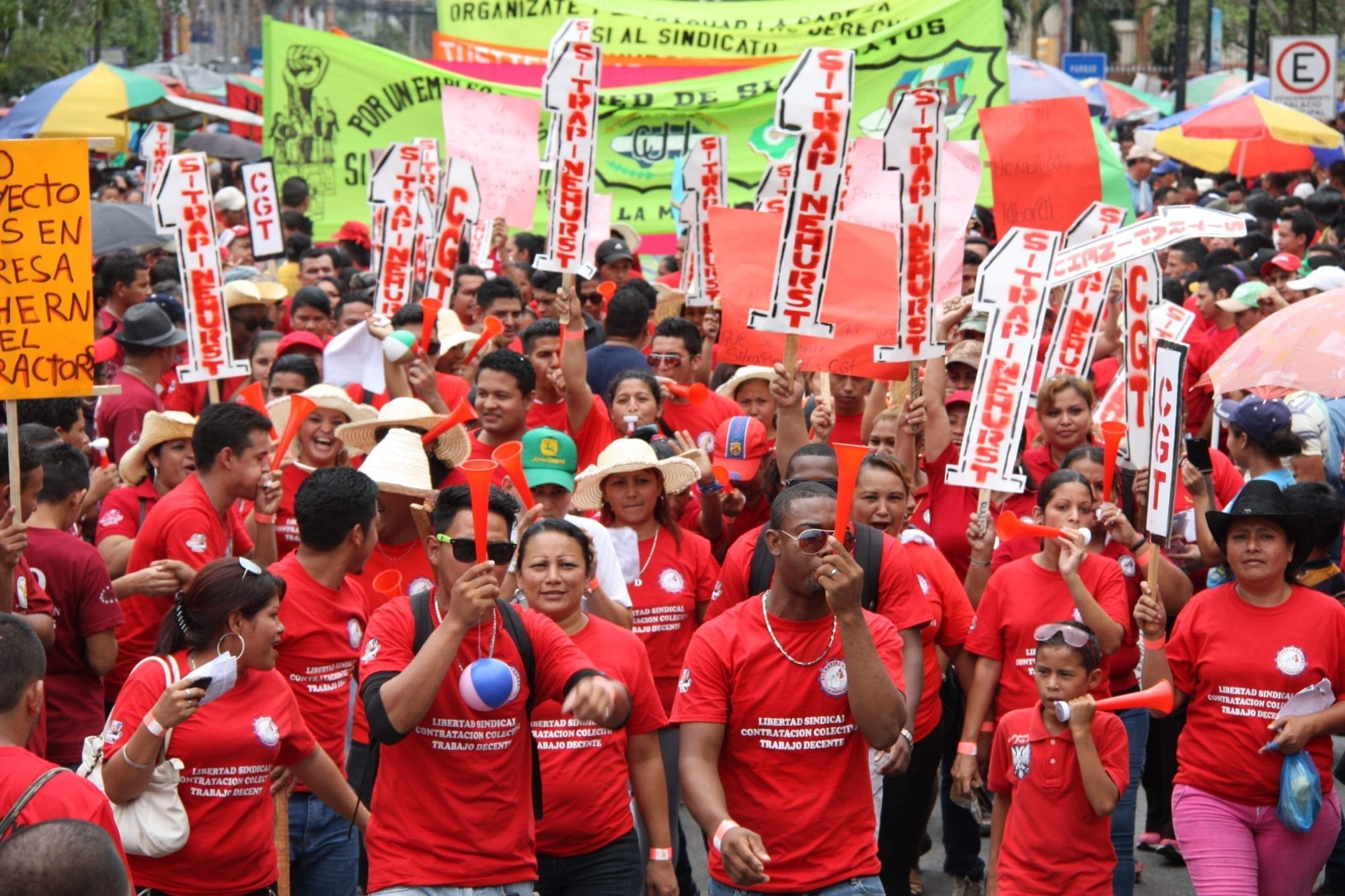
Apr 19, 2017
A brutal attack against a union leader and his brother in Honduras is the latest in escalating violence directed at worker rights activists there, according to the Honduran National Network for Violence Against Trade Unionists and other Solidarity Center partners in the country.
Moisés Sánchez, secretary general of the melon export branch of the Honduran agricultural workers’ union, Sindicato de Trabajadores de la Agroindustria y Similares (STAS), and his brother, union member Misael Sánchez, say they were attacked late last week by six men wielding machetes as they left the union office in the southern town of Choluteca, an area where agricultural workers harvest melons and other export produce.
Miseal was seriously injured after the attackers slashed his face with a machete, and Moisés was beaten for nearly an hour and told he would be murdered if he continued to assist melon workers in gaining their rights at work through the union. Misael left the hospital on Monday and is expected to survive.
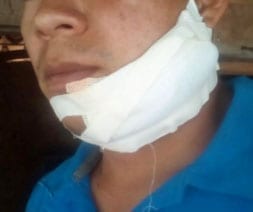
Six men attacked union member Misael Sánchez and his brother, Moisés Sánchez, a union leader, as part of a campaign targeting union activists. Credit: STAS
Honduran Government Not Protecting Targeted Union Activists
Last year, some 20 Honduran trade union activists were killed or threatened for their efforts in helping workers improve their harsh working conditions.
In recent weeks, violence or threats of violence against union activists has escalated. Isela Juárez Jiménez, president of the public employee union SITRASEMCA, says she recently suffered an attempted kidnapping. Juárez Jiménez, began receiving death threats in 2015, and her motorbike was rammed in September by a white Toyota, which had been following her for days.
Two other union leaders, Nelson Núñez of the banana and agricultural worker federation, FESTAGRO, and Miguel Angel López of the public-sector electrical workers’ union STENEE, say they recently have been followed, with López reporting a man gesturing to pull out a pistol after pulling up to his car window. Both Núñez and López received death threats last year for their organizing efforts in Honduras. Núñez’s most recent threats similarly relate to the organizing efforts in Choluteca. Patricia Riera, another FESTAGRO organizer, was the first organizer to receive death threats related to a melon worker union organizing effort in Choluteca.
Although the Inter-American Commission on Human Rights last year ordered the Honduran government to protect targeted union members, Honduras has not done so. The Network against Violence in Honduras and its sister organization in Guatemala are calling on the Honduran government to provide private security to activists who receive death threats. The networks are urging the government to investigate all murders and bring to justice the perpetrators—both those who committed the acts and those who planned them.
Workers Fired, Harassed for Seeking Union
Melon workers on plantations across the Choluteca region have long endured worker rights abuses. After they sought to improve their working conditions by forming unions in 2016 with STAS, a FESTAGRO affiliate, employers intimidated and illegally fired many workers, despite Honduran law and international conventions making it illegal to retaliate against workers for organizing unions to protect their rights on the job.
According to FESTARGO, plantation owners forced the first four union leaders to renounce the union, fired 21 union members during the spring 2016 planting season, and refused to rehire 35 unionized workers for the fall harvest. And after 47 security workers at one plantation joined the union in March, the company fired all of them.
Despite touted progress toward fulfilling the Monitoring and Action Plan developed with the U.S. government to address labor rights violations, retaliation against workers seeking unions and sustained anti-union attacks and violence persist.
The Monitoring and Action Plan was created after the AFL-CIO and 26 Honduran unions in 2012 filed a submission with the U.S. Department of Labor on the Honduran government’s failure to enforce its labor laws under the labor chapter of the Central American Free Trade Agreement (DR-CAFTA). The submission cited examples from 17 worksites spanning the manufacturing, agriculture and port sectors.
In a 2015 Public Report on the 2012 DR-CAFTA labor chapter complaint, the U.S. Office of Trade and Labor Affairs found ongoing basic labor rights violations at these same export plantations, including nonpayment of minimum wages and legally mandated benefits, wage theft, child labor and allowing children to use hazardous chemicals, and failure to provide potable water, social security enrollment and days to rest.
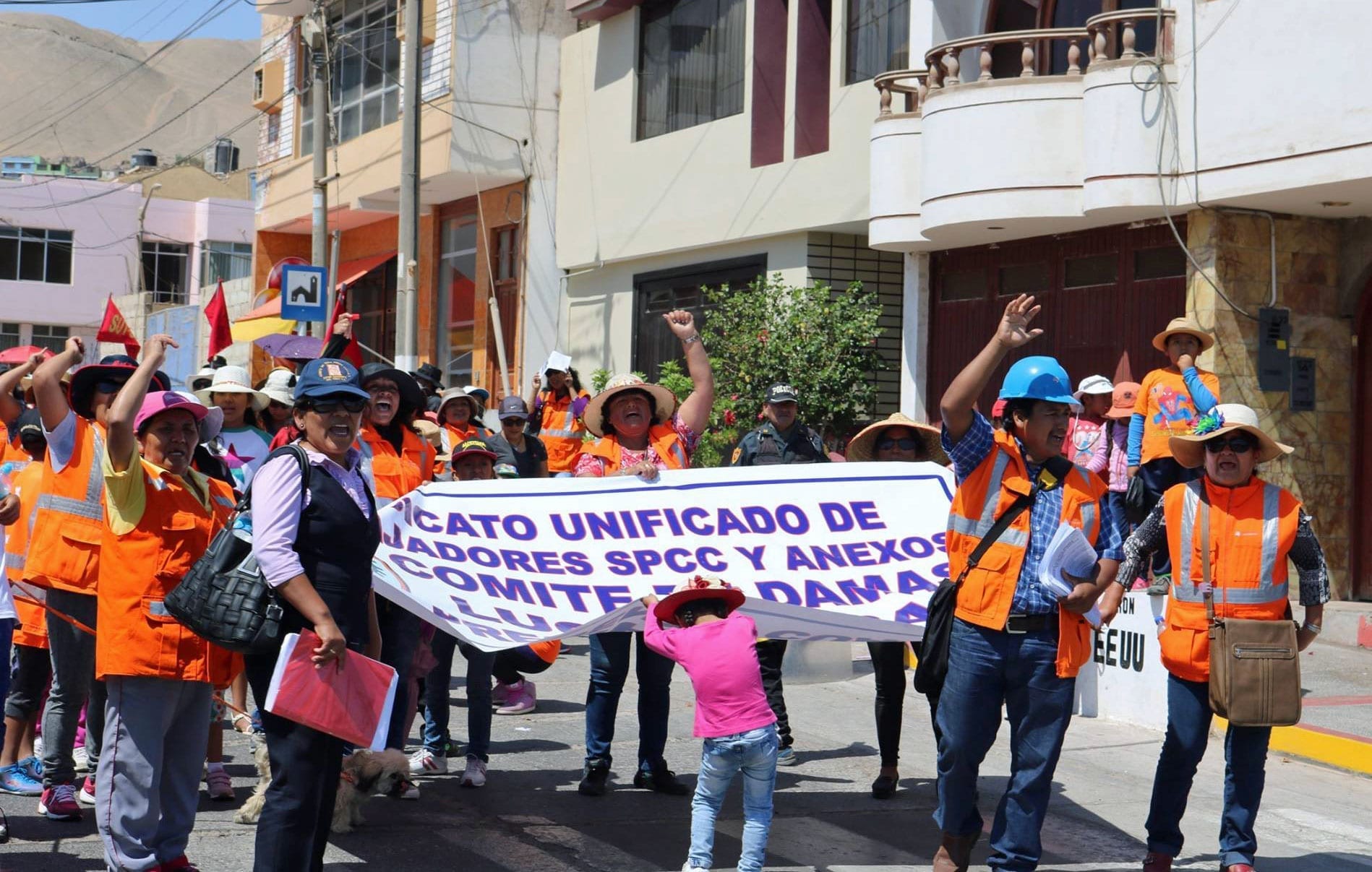
Apr 17, 2017
Update: Striking mine workers are standing strong despite the Peru Ministry of Labor declaring their strike illegal during a second appeal process yesterday and company threats to fire all the workers if they do not return to work by Wednesday. Construction workers, members of the Peruvian General Workers Confederation (CGTP), announced that they will join the strike in solidarity.
On Sunday, police fired tear gas at strikers as they walked a picket line near an industrial railroad bridge above the Osmore River. The striking workers now control both sides of the bridge, preventing rail passage of the minerals from the mines to the nearby town of Ilo, where there is the refinery and the port. On Tuesday, the SUT-SPCC union is conducting worker assemblies in Ilo to make decisions for next steps.
……………….
Some 2,000 miners on strike at Southern Copper Corp. in Peru (SPCC) are meeting with government negotiators again today over issues that prompted their walkout: improved profit-sharing, better medical care, an end to company surveillance of workers and the reinstatement of dismissed workers. (Workers and their families rally in this video.)
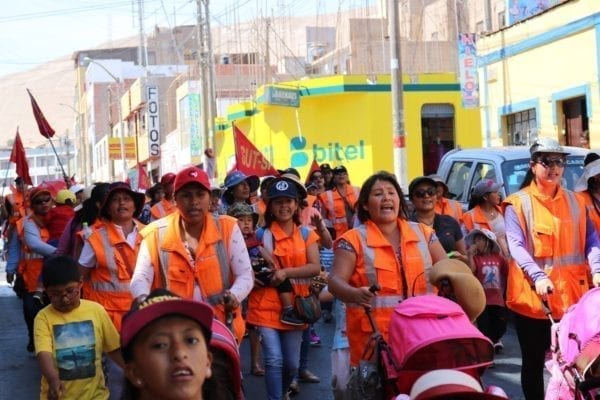
Miners’ families rallied in support of the striking workers. Credit: Colectivo Resistencia Sur Tacna
The miners, members of the Sindicato Unificado de la Southern y Anexos (SUT SPCC), went on strike last week after negotiations broke down, halting operations at the Toquepala and Cuajone mines. The union’s general secretary, Jorge Campos, was arbitrarily dismissed in 2016, according to the miners, and his reinstatement is among their demands.
From the United States, the United Steelworkers condemned the company’s attempts to fire striking workers and the decision of the Peruvian Labor Ministry to declare the strike illegal. The ministry argued the issues are not subject to collective bargaining and the union has appealed the ruling.
IndustriALL Director Fernando Lopes also condemned the actions of the company, noting it is part of Grupo Mexico, “known for its violations of freedom of association in Mexico and the USA. Peruvian workers will not let the company do the same thing to them. We extend all our support to the union and the federation.”
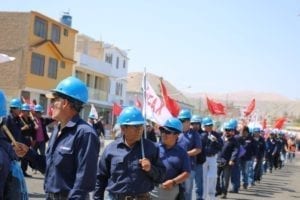 Also, IndustriALL General Secretary Valter Sanches wrote to SPCC company president, Oscar González Rocha, to urge him to negotiate in good faith with the SUT SPCC.
Also, IndustriALL General Secretary Valter Sanches wrote to SPCC company president, Oscar González Rocha, to urge him to negotiate in good faith with the SUT SPCC.
The SUT SPCC is affiliated to the National Federation of Miners and Metalworkers of Peru (FNTMMSP), which is in turn affiliated to IndustriALL Global Union.

Apr 17, 2017
Workers who migrate to other countries for jobs often do not know their rights when they arrive, and many, like domestic workers, toil in isolation, where they are easily exploited by employers.
Rosalie Ewengue, a domestic worker in Morocco from the Democratic Republic of Congo, was among them. But after taking part in an awareness-raising campaign with Afrique Culture Maroc, she learned about her rights in the country and on the job, including how to apply for legal status—and now helps other domestic workers do the same.
 Working with the Collectif des Travailleurs Migrants au Maroc (Morocco Migrant Workers Organization), in partnership with the Solidarity Center, Rosalie is reaching out to migrant domestic workers across Morocco.
Working with the Collectif des Travailleurs Migrants au Maroc (Morocco Migrant Workers Organization), in partnership with the Solidarity Center, Rosalie is reaching out to migrant domestic workers across Morocco.
Rosalie’s story is the latest personal narrative on the Solidarity Center Workers Equality Forum. The online, interactive Equality Forum connects working people and amplifies their voices by enabling them to share their stories, joys, struggles and strategies to better their lives and livelihoods.
Find out more about Rosalie’s story here and meet other workers from around the world, including Lwin Lwin Mar, a Burmese garment worker, and Sam Oliver, a union shop steward working on a Liberian rubber plantation.

Apr 14, 2017
Hi, I am Rosalie Ewengue, I am Congolese. I have worked as a domestic worker in Morocco for eight years, and have been an undocumented migrant worker for six years. I participated in an awareness-raising campaign with the Afrique Culture Maroc and Solidarity Center that focused on the issues facing undocumented migrant workers, and I tried to encourage undocumented women migrant workers to approach the regularization office and register themselves. That’s how I became an activist and a member of Collectif des Travailleurs Migrants au Maroc (Morocco Migrant Workers Organization).
In 2015, and always with Solidarity Center’s partnership, we launched an awareness-raising campaign focused on domestic workers. The goal was to identify the domestic workers and to learn more about their status and working conditions.
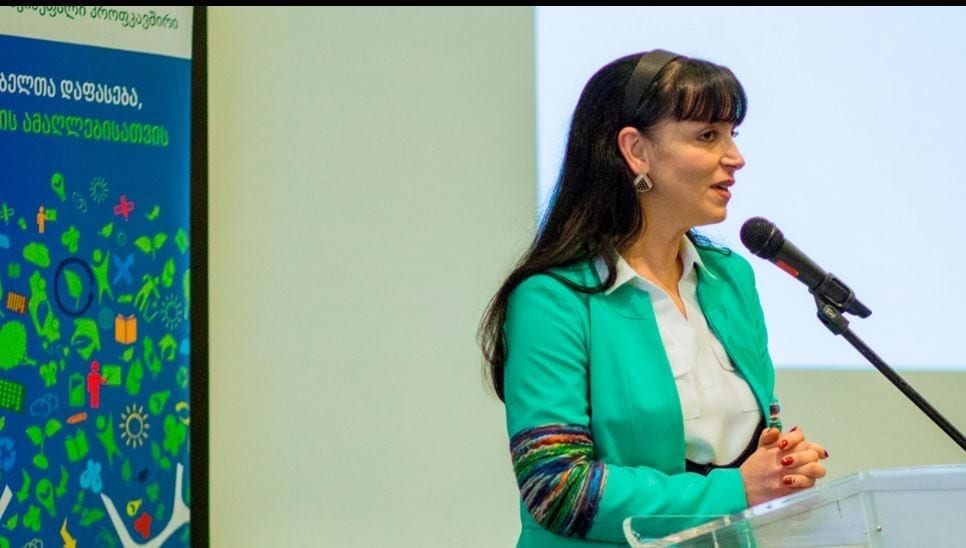
Apr 10, 2017
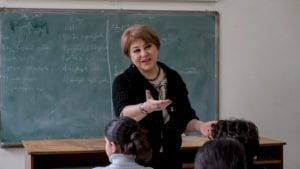
Tamar Barisashvili, Georgian language teacher and ESFTUG member, in the classroom. Credit: Lela Mepharishvili
In a precedent-setting move, the union representing teachers in Georgia signed a pact with the education ministry last month, signaling the new government’s willingness to partner with teachers—although unions in other sectors, including the railways and postal sector remain under attack. Unions in Georgia have struggled for their right to organize for more than a decade now, including under former president Mikheil Saakashvili.
“The decision of the Minister of Education and Science to sign the sectoral agreement shows clearly how democratic processes are developing and the democratic management in the education sector is being established,” said the president of the ESFTUG education union, Maia Kobakhidze, representing teachers.
Committing the ministry to work in partnership with the ESFTUG, the agreement sets a path for cooperation on laws and regulations affecting teachers, collective agreements with the union regarding teachers’ compensation, work conditions and benefits, as well as any new education initiatives.
The agreement reverses more than a decade of an anti-union campaign by the former administration, as a result of which the country’s labor federation, GTUC, lost more than 100,000 members, and the teachers’ union came close to collapse.
In recognition of the significance of the agreement, the signing ceremony in Tblisi on March 16, 2017, by ESFTUG’s Kobakhidze and Education Minister Aleksandre Jejelava was widely covered by media, and gathered together 300 guests. Attendees included representatives of the teachers, ministry officials, members of the diplomatic corps, including the U.S. Embassy, the International Labor Organization (ILO), the global union federation Education International (EI) and several nongovernmental organizations.
Jejelava thanked ESFTUG during his speech for giving his ministry the opportunity to work with the union to create better conditions for teachers and defend their rights, so they may better serve Georgia’s children.
The Solidarity Center has partnered with Georgian trade unions for almost two decades, providing programs that support legislative research and training in defense of worker and union rights, promote activities designed to increase union integration and coordination, help unions represent their members and reach out to unorganized workers, and educate workers about principles of democratic trade unionism.





 Also, IndustriALL General Secretary Valter Sanches
Also, IndustriALL General Secretary Valter Sanches 



